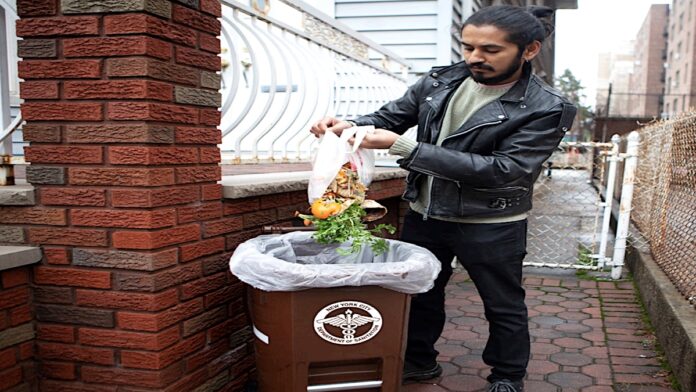“New York City Residents Face Fines for Not Composting: What You Need to Know”
New York City residents are now required to separate organic waste from trash destined for landfills, as mandated by the New York City Department of Sanitation. The curbside composting program, which went into effect at the beginning of this month, has already resulted in hundreds of fines being issued to property owners who fail to comply.
According to the Department of Sanitation, all residents are expected to separate their organic waste and place it in a brown bin provided by the department or in a labeled bin with a secure lid. The compost waste can then be placed on the curb for pickup on the same day as recycling pickup.
Failure to properly compost organic waste can result in fines for property owners. Buildings with up to eight units face fines of $25 for the first offense, $50 for the second offense, and $100 for each additional offense. Buildings with more than nine units could receive fines of $100 for the first offense, $200 for the second offense, and $300 for each additional offense.
In the first week of April, the city issued nearly 2,000 fines for non-compliance with the composting mandate. This strict enforcement has led to an increase in compostable material collection, with 2.5 million pounds collected in early April compared to 737,000 pounds collected before the mandatory composting program was implemented city-wide.
While some residents have expressed concerns about the fines as a method of encouraging composting, city officials believe that education and outreach are key to promoting compliance. Other cities with long-standing composting programs have found that providing resources and assistance to residents can be effective in increasing participation.
Critics have also raised questions about the transparency of the composting process, including where the collected compost will go. Some of the compost is used for biogas production, which can have environmental implications. Cities like San Francisco and Los Angeles use organic waste collected from composting programs for fertilizing farmland, a more sustainable practice.
Despite the challenges and criticisms, the composting regulations in New York City are a step towards improving the city’s residential composting rate. However, there are calls for additional educational resources and alternatives to burning compost for fuel to make the process more sustainable and equitable.
The composting regulations are already facing opposition, with a bill introduced by the New York City Council to overturn the mandate. This ongoing debate highlights the complexities of implementing and enforcing composting programs in urban environments.
